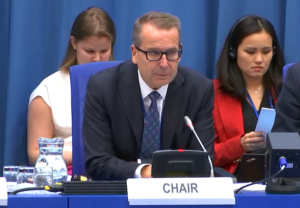Members of the US Congress Nuclear Weapons and Arms Control Working Group sent a joint letter to President Biden on July 22 calling on the President to ensure that the Nuclear Posture Review which is currently being undertaken by the Department of Defence (DoD), establish a reduced role for nuclear weapons in US security and defence doctrine, including to affirm that the US would not introduce nuclear weapons into a conventional armed conflict, nor fire first in any nuclear conflict (no-first-use policy).
The letter reminds President Biden that ‘as a United States Senator and then as Vice President, you were a party to every major nuclear weapons debate of the past five-decades. From bolstering the Anti-Ballistic Missile Treaty, to building European support for the Intermediate-Nuclear Forces Treaty, to securing votes for ratification of the New START Treaty, you have consistently been on the right side of history.’ And it calls on the President to use the Nuclear Posture Review process to ‘reject a 21st century arms race and make bold decisions to lead us towards a future where nuclear weapons no longer threaten all humanity.’
In calling for a US no-first-use policy, the letter quotes President Biden’s own words “Given our non-nuclear capabilities and the nature of today’s threats — it’s hard to envision a plausible scenario in which the first use of nuclear weapons by the United States would be necessary. Or make sense.”
The letter was drafted by the four Co-Chairs of the Nuclear Weapons and Arms Control Working Group, Senator Edward J. Markey – who also serves as Co-President of Parliamentarians for Nuclear Non-proliferation and Disarmament – Senator Jeffrey A. Merkley and Representatives Don Beyer and John Garamendi. It is endorsed by 18 of their fellow legislators.
In addition to advancing no-first-use, the letter calls on the President to:
- Direct the Department of Defense to include in its proposed target list a breakdown of the damage expectancy, civilian casualties, and climatic and humanitarian consequences stemming from nuclear weapons use.
- Examine the number and types of new weapons needed to deter nuclear attack, taking into account recommendations from the Government Accountability Office to consider deferring or cancelling certain nuclear weapons modernization programs.
- Complete independent review of the proposed intercontinental ballistic missile (ICBM) – the Ground Based Strategic Deterrent – that looks into the technical feasibility and comparative cost savings of life-extending the current Minuteman III ICBM.
- Eliminate two of President Trump’s new types of nuclear weapons: the nuclear sea-launched cruise missile (SLCM) under development and the low-yield W-76(2) warhead already deployed on U.S. ballistic missile submarines.
- Commit to pursuing robust diplomacy with Russia and China on arms control through U.S.-Russia bilateral strategic stability talks, which build upon an extended New START Treaty, and starting a new bilateral U.S.-China strategic stability dialogue that builds towards the eventual conclusion of arms control measures that reduce the risk of miscalculation.
It is understood that although President Biden supports no-first-use – as did Barack Obama during his term as president – continued resistance to no-first-use from both domestic opponents and US allies makes it a difficult task for the President to ensure that the Nuclear Posture Review embraces this proposed policy.
The DoD and the defence establishments of the US allies (NATO, Japan and South Korea) argued during President Obama’s term that the first-use option was required to protect allies from conventional, chemical or biological attacks such as from Russia or North Korea. As such, all that President Obama achieved in his NPR was a policy highlighting that the primary purpose of nuclear weapons is to deter nuclear weapons, and a commitment to ‘consult with allies and partners regarding the conditions under which it would be prudent to shift to a policy under which deterring nuclear attack is the sole purpose of U.S. nuclear weapons.’
This highlights the importance of building support for no-first-use amongst the allied governments – one of the principal objectives of NoFirstUse Global – in order to ensure success.




